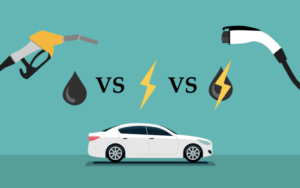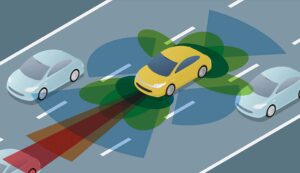5 Simple Ways to Improve Your Vehicle’s Fuel Efficiency
Are you tired of constantly filling up your gas tank and watching your hard-earned money go down the drain? With rising gas prices, it’s no surprise that many people are looking for ways to improve their vehicle’s fuel efficiency. Not only does it save you money, but it also helps the environment by reducing carbon emissions. In this article, we will discuss 5 simple ways to improve your vehicle’s fuel efficiency.
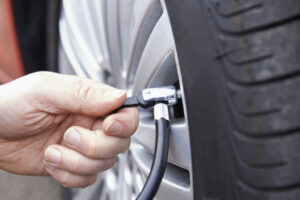
1. Keep Your Tires Properly Inflated
One of the easiest ways to improve your vehicle’s fuel efficiency is by keeping your tires properly inflated. Under-inflated tires create more resistance, which means your engine has to work harder and burn more fuel to keep your car moving. This can decrease your fuel efficiency by up to 3%. On the other hand, over-inflated tires can also be harmful as they reduce the contact area between the tire and the road, making it harder to control your vehicle. It is recommended to check your tire pressure at least once a month and keep them at the recommended level.

2. Avoid Excessive Idling
Do you often find yourself waiting in your car with the engine running? This may seem harmless, but it actually wastes a significant amount of fuel. Idling for just 10 minutes can use up to half a gallon of gas. If you know you will be waiting for more than a minute, it is better to turn off your engine. Not only will this save you money on gas, but it also reduces carbon emissions and helps the environment.

3. Use Cruise Control on Highways
Using cruise control on highways can significantly improve your vehicle’s fuel efficiency. It helps maintain a constant speed, which reduces the amount of fuel needed to keep your car moving. This is especially useful on long road trips where you may be tempted to speed up and slow down frequently. However, it is important to note that cruise control is not recommended for hilly or winding roads as it can actually decrease fuel efficiency in those situations.

4. Remove Excess Weight
Do you have unnecessary items in your car that you never use? Carrying around excess weight can decrease your vehicle’s fuel efficiency. The more weight your car has to carry, the harder your engine has to work, and the more fuel it burns. Take some time to declutter your car and remove any items that you don’t need. This will not only improve your fuel efficiency but also give you more space and a lighter load to carry.
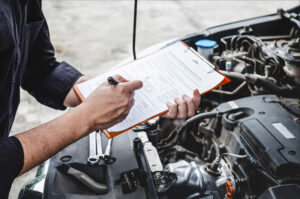
5. Keep Up with Regular Maintenance
Regular maintenance is crucial for keeping your vehicle running smoothly and efficiently. A well-maintained car can improve fuel efficiency by up to 4%. Make sure to follow your car’s recommended maintenance schedule, which includes oil changes, air filter replacements, and spark plug replacements. Keeping your car in good condition not only saves you money on gas but also prevents any potential breakdowns or costly repairs in the future.
In conclusion, improving your vehicle’s fuel efficiency doesn’t have to be complicated or expensive. By following these 5 simple tips, you can save money on gas and help the environment at the same time. Remember to keep your tires properly inflated, avoid excessive idling, use cruise control on highways, remove excess weight, and keep up with regular maintenance. With these small changes, you can make a big difference in your vehicle’s fuel efficiency. So, the next time you fill up your gas tank, you’ll be happy to see your money going a little further.
The Top Fuel Efficiency Tips for Long Road Trips
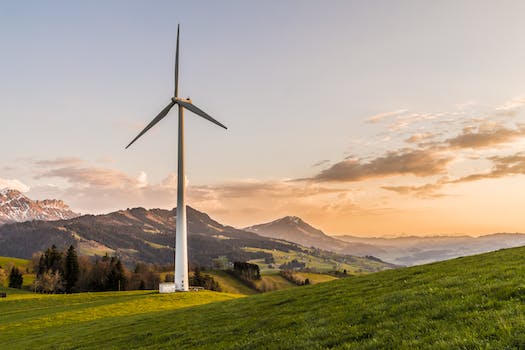
Are you planning a long road trip? Whether you’re heading out on a family vacation or a solo adventure, one thing is for sure – you want to save money on gas. Fuel efficiency is not only good for your wallet, but it’s also good for the environment. So, how can you make your long road trip more fuel-efficient? Here are the top fuel efficiency tips for long road trips.
First and foremost, it’s important to plan your route carefully. Avoiding heavy traffic and construction zones can save you a significant amount of fuel. Use a GPS or a map app to find the most efficient route to your destination. This will not only save you time but also reduce the amount of gas you use.
Another tip for fuel efficiency on long road trips is to pack light. The more weight your car carries, the more fuel it will consume. So, before you hit the road, make sure to remove any unnecessary items from your car. This includes items in your trunk, roof rack, and even inside the car. Every pound counts when it comes to fuel efficiency.
Maintaining your car is crucial for fuel efficiency, especially on long road trips. Make sure to get your car serviced before your trip. This includes checking the tire pressure, changing the oil, and replacing any worn-out parts. A well-maintained car will run more efficiently and use less fuel.
When driving on the highway, it’s important to maintain a steady speed. Constantly accelerating and braking can significantly decrease your fuel efficiency. Use cruise control whenever possible to maintain a consistent speed. This will not only save you fuel but also make for a more comfortable and relaxed drive.
Another tip for fuel efficiency on long road trips is to avoid idling. If you’re stuck in traffic or waiting for someone, turn off your engine. Idling for more than 10 seconds uses more fuel than restarting your car. So, if you’re going to be stopped for a while, it’s better to turn off your engine and save some gas.
Properly inflating your tires can also improve your car’s fuel efficiency. Underinflated tires create more resistance, which means your car has to work harder and use more fuel. Check your tire pressure before your trip and make sure they are inflated to the recommended level. This will not only save you fuel but also improve your car’s handling and safety.
Another way to save fuel on long road trips is to avoid using the air conditioning. While it may be tempting to blast the AC on a hot day, it can significantly decrease your car’s fuel efficiency. Instead, try opening the windows or using the air vents to circulate air. If you must use the AC, set it to a moderate temperature and turn it off when you don’t need it.
Lastly, consider using a fuel-efficient vehicle for your long road trip. If you have the option, choose a car with good gas mileage. Hybrid or electric cars are also great options for long road trips as they use less fuel and emit fewer emissions.
In conclusion, there are many ways to make your long road trip more fuel-efficient. From planning your route to maintaining your car and driving smart, these tips can help you save money on gas and reduce your carbon footprint. So, before you hit the road, make sure to follow these fuel efficiency tips for a smoother and more eco-friendly journey.
A Comparison of Hybrid vs. Gasoline Cars: Which is More Fuel Efficient?
When it comes to choosing a car, fuel efficiency is often a top priority for many people. With the rising cost of gas and the increasing concern for the environment, it’s no wonder that more and more drivers are looking for ways to save on fuel. One of the biggest debates in the automotive world is whether hybrid or gasoline cars are more fuel efficient. In this article, we will compare the two and help you determine which one is the better choice for you.
First, let’s define what a hybrid car is. A hybrid car is a vehicle that uses two or more power sources to run. This typically includes a gasoline engine and an electric motor. The electric motor is powered by a battery that is charged through regenerative braking and the gasoline engine. On the other hand, a gasoline car runs solely on gasoline, with no electric motor or battery involved.
One of the main advantages of a hybrid car is its fuel efficiency. Since it uses both a gasoline engine and an electric motor, it can achieve better gas mileage compared to a gasoline car. In fact, some hybrid cars can get up to 50 miles per gallon, while most gasoline cars average around 25 miles per gallon. This means that a hybrid car can save you a significant amount of money on gas in the long run.
Another factor to consider is the cost of the car itself. Hybrid cars tend to be more expensive than gasoline cars. This is due to the advanced technology and components needed to make them more fuel efficient. However, with the rising demand for hybrid cars, the prices have become more competitive in recent years. Additionally, some states offer tax incentives for purchasing a hybrid car, which can help offset the initial cost.
Maintenance is also an important aspect to consider when comparing hybrid and gasoline cars. Since hybrid cars have both a gasoline engine and an electric motor, they require more specialized maintenance. This can be more expensive compared to a gasoline car, which only needs regular oil changes and tune-ups. However, hybrid cars tend to have a longer lifespan and require fewer repairs, which can save you money in the long run.
One of the biggest concerns for drivers is the performance of a hybrid car compared to a gasoline car. Many people assume that hybrid cars are slower and less powerful due to their electric motor. However, this is not necessarily true. In fact, some hybrid cars have a combined horsepower that is higher than some gasoline cars. Additionally, the electric motor in a hybrid car can provide an extra boost of power when needed, making it a great option for city driving.
When it comes to the environment, hybrid cars are the clear winner. Since they use both a gasoline engine and an electric motor, they emit significantly less pollution compared to gasoline cars. This makes them a more eco-friendly option for those who are concerned about their carbon footprint.
In conclusion, both hybrid and gasoline cars have their own advantages and disadvantages when it comes to fuel efficiency. Hybrid cars are more fuel efficient and environmentally friendly, but they can be more expensive and require specialized maintenance. Gasoline cars, on the other hand, are more affordable and easier to maintain, but they are not as fuel efficient and emit more pollution. Ultimately, the choice between the two will depend on your personal preferences and needs. Consider your budget, driving habits, and environmental concerns when making your decision. Whichever option you choose, remember that proper maintenance and driving habits can greatly impact the fuel efficiency of your car.

